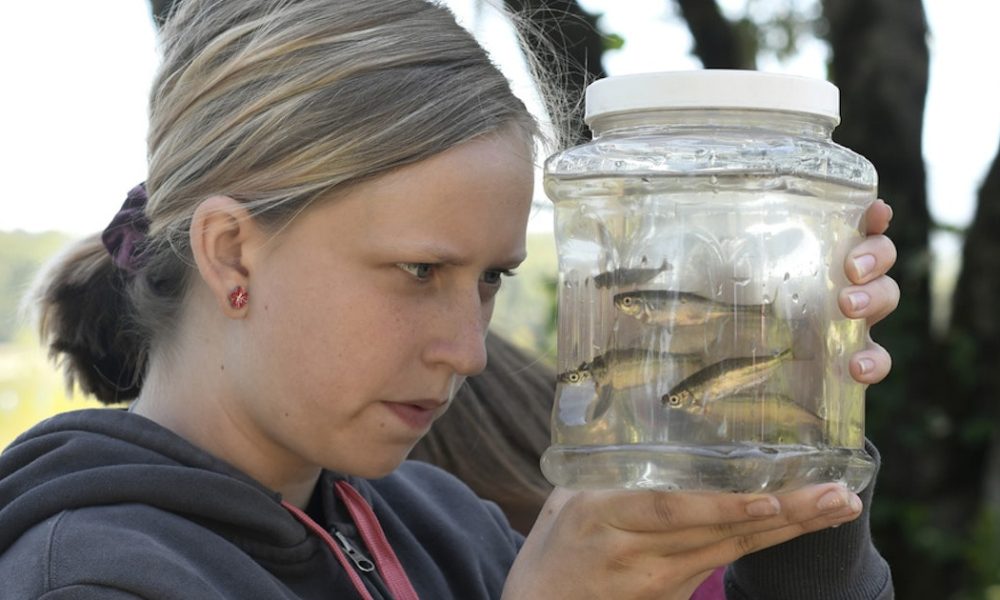 CMS seventh grader Kimberlee Kelsey faces off with some fish that Watershed Olympics participants were asked to identify by species. Gini Davis/The Creswell Chronicle
CMS seventh grader Kimberlee Kelsey faces off with some fish that Watershed Olympics participants were asked to identify by species. Gini Davis/The Creswell Chronicle
Nine Creswell Middle School students became ”Olympic” champions last week, winning the 2019 Riparian Restoration Olympic Games (a.k.a., the Watershed Olympics), held June 4 at My Brothers’ Farm east of Creswell.
”I’m so proud of our team,” said seventh grader Haley Ross, noting that CMS placed third last year.
During the ”Watershed Olympics,” seventh and eighth graders from throughout the Eugene-Springfield area test their watershed knowledge and skills by identifying plants, fish and macroinvertebrates, participating in a mulching relay and taking a Riparian Restoration Knowledge Assessment.
”Our team did a great job with mulching,” said seventh grader Kimberlee Kelsey. ”It was a lot of hard work, but teamwork was a big part of it.”
”You get so sweaty and get to show how much you really can do,” Ross added.
Team members agreed that the plants and fish were easier to identify than the macroinvertebrates.
”We knew all the plants,” said eighth grader Jordynn Risdal, a two-year participant.
”I was surprised we only had to identify three fish; I thought we’d have to identify about 12 or 13,” added seventh grader Jennalyn Kruger.
”But the bugs (macroinvertebrates) were hard to identify,” said eighth grader Noelle Holst, another two-year participant.
”A lot harder,” agreed seventh grader Tylyn Bowles. ”There were one or two we hadn’t even learned.”
The annual event is the culmination of Coast Fork Willamette Watershed Council’s WATERS (Watershed Action Teams for Education, Restoration and Stewardship) program.
Accompanied by their advisor, science teacher Anna Baltrusch, CMS WATERS students spent one school day per month with CFWWC Education/Outreach and GIS Specialist Maggie O’Driscoll, gaining hands-on knowledge of watershed topics such as watershed basics, the riparian zone, twig and leaf identification, water quality, fish biology and macroinvertebrates.
On farmland west of Creswell, ”We planted willow branches to get more willows to grow next to the stream, collected and planted acorns and about 10 species of native trees and plants good for riparian areas and we moved fallen tree branches after the snowstorm,” Baltrusch said.
The group also learned about fish identification, trapping and counting from an Oregon Department of Fish and Wildlife fish biologist, dug up and identified macroinvertebrates, learned about water quality testing and visited Creswell’s water treatment plant near the Willamette River to learn how the city’s water is purified.
This is the second year that CMS has participated in the program, and ”the kids really love it,” Baltrusch said, adding that students must apply to CFWWC for spots on the team.
In part, O’Driscoll ”looks for kids who are looking to go into some type of environment or ecology work,” Baltrusch said.
That’s the case for Risdal – who hopes to become ”some type of outdoor environmental scientist.” In addition to Creswell’s team win, she and Ross received Outstanding Achievement certificates during this year’s Riparian Restoration Olympic Games.
”Each year, from every team, we pick out a couple of students who excelled in both field work and lessons throughout the year,” said CFWWC Education Coordinator Justin Demeter.
McKenzie placed second in team standings; Thurston 1 placed third and Child’s Way received honorable mention. Other participating schools/teams were Thurston 2, Agnes Stewart Middle School, Coburg 1, Coburg 2, Briggs 1, Briggs 2, Hamlin and London.
”The difference between No. 1 and No. 2 was less than a point – so remember that when you come again next year,” Demeter told participants. ”I hope you all feel good about what you accomplished this year. Looking at the scores, you all did phenomenal.”








